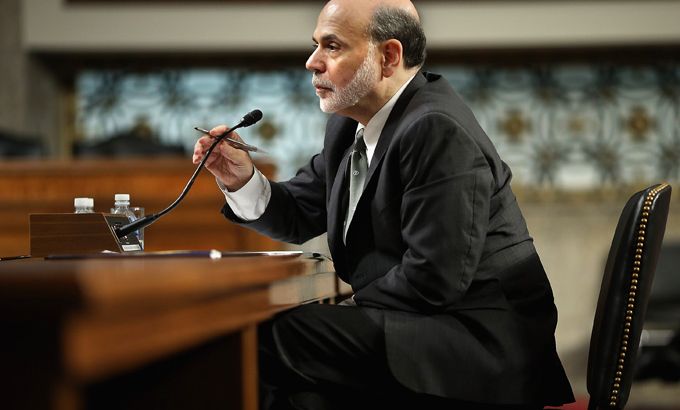Ben Bernanke says Libor system flawed
Chairman of US Federal Reserve says the rate-fixing scandal undermines confidence in the financial system.

Ben Bernanke, the chairman of the US Federal Reserve, has said that revelations a key interbank lending rate had been fixed were “very troubling” and undermined confidence in the financial system.
Speaking to the US Congress on Tuesday, Bernanke said the disclosures, which have resulted in a large fine for British bank Barclays, showed the so-called Libor system was “structurally flawed”.
Keep reading
list of 4 items‘We need you’: Solomon Islands’ support for US agency’s return revealed
Why are nations racing to buy weapons?
Parallel economy: How Russia is defying the West’s boycott
The London interbank offered rate, or Libor rate, affects the interest on many loans. The process for setting Libor has come under scrutiny since Barclays admitted two weeks ago that it had submitted false information to keep the rate low.
“Libor is a critical benchmark to many financial contracts,” Bernanke said.
“The actions of traders and banks that have been disclosed are not only very troubling in themselves, but they have the effect of undermining markets,” he said in testimony to the Senate Banking Committee.
Emails, phone transcripts and internal reports released last week by the New York Fed show the regulator was explicitly told banks were misstating their input to the Libor interbank lending rate.
“We’ll get more information on that as the investigations continue, but it’s clear that beyond these disclosures that the Libor system is structurally flawed and part of the response was to address those flaws,” Bernanke said.
Bernanke said that because many of those reforms were not adopted by the British authorities, he could not vouch for the reliability of the rate today.
Emails also show that the NY Fed – which is tasked with assessing the safety and soundness of US banks – in June 2008 shared its concerns with the Bank of England, which regulates the territory where the Libor is set.
Bernanke said he learned from news reports four years ago that banks were manipulating a key British interest rate. But he said that the Fed was powerless to do anything beyond contacting British authorities.
Concerns raised
Meanwhile, Mervyn King, the governor of the Bank of England, on Tuesday told a House of Commons committee in London that US authorities did not show him any evidence of manipulation of a key market rate when they raised concerns in 2008.
He said that during that financial crisis, there was widespread concern about what the Libor was indicating about the state of banks. However, there were no fears being voiced about misreporting.
| THE LIBOR SCANDAL | |||||||||||
|
At the height of the 2008 credit crisis, following the collapse of Lehman Brothers, interbank borrowing dried up as fear and speculation over which lender would be the next to fail gripped the markets lenders.
King said the first he knew of any alleged wrongdoing during 2008 “was when the reports came out two weeks ago.”
Those reports by the US Department of Justice, the Commodity Futures Trading Commission and Britain’s Financial Services Authority detailed rate manipulation by Barclays between 2005 and 2009.
Barclays has since been fined $453 million by US and UK financial authorities for manipulating Libor. Barclays’ chief executive Bob Diamond resigned as a result of the scandal and chairman Marcus Agius says he will go once his successor is chosen.
“We have been through all our records. There is no evidence of wrongdoing or reporting of wrongdoing to the Bank [of England],” King said.
An analysis published by the NY Fed in May 2008 noted that although banks “may have incentives to misreport in order to manipulate the level of the Libor fixing, and thereby influence their funding or derivative positions, this is not the primary driver of recent alleged misquotes.”
Bernanke on Tuesday pointed out that banks did not appear to be manipulating the rate for profit and money did not always change hands amid a lack of liquidity in markets during the financial crisis.
Barclays’s fines paid to US and British regulators related to the manipulation of products derived from Libor, rather than the manipulation of the rate itself.
